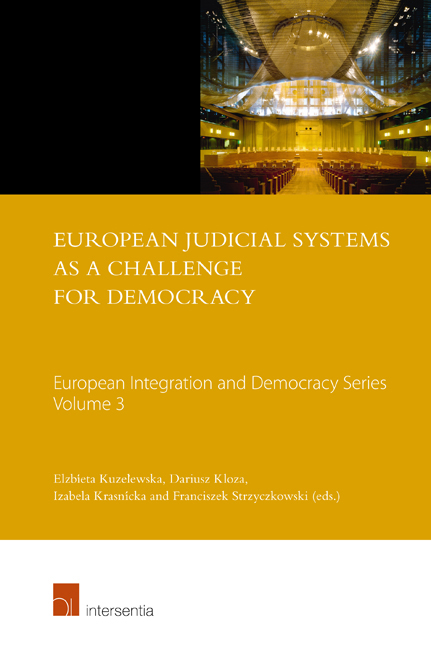Book contents
- Frontmatter
- Foreword
- Preface
- Contents
- List of Abbreviations
- PART ONE THE COURT OF JUSTICE OF THE EUROPEAN UNION
- 1 Democracy in Constitutional Politics of European Courts: An Overview of Selected Issues
- 2 The Institutional Balance as CJEU's Contribution to Democracy in the Union: Selected Issues
- 3 From Judicial Dialogue Towards Constitutional Spill-Over? The Economic Analysis of Preliminary Reference Procedure and the Application of the EU Charter of Fundamental Rights
- 4 Towards the Democratization of the EU? Strengthening prerogatives of the European Parliament in the case law of the Court of Justice of the European Union
- 5 Democratic Values in the Court of Justice Adjudication on the Private Enforcement of the European Union Competition Law
- 6 Judicial Control of Monetary and Fiscal Decisions in the European Union
- 7 How CJEU's “Privacy Spring” Construed the Human Rights Shield in the Digital Age
- 8 The Supremacy of the EU Law as Interpreted by the Polish Constitutional Tribunal
- 9 Reception of EU Law in Polish Courts – A Case of “Teddy Bear” Law
- 10 Enforcing Europe's Foundational Values in Central and Eastern Europe: A Case in Point
- PART TWO THE EUROPEAN COURT OF HUMAN RIGHTS
8 - The Supremacy of the EU Law as Interpreted by the Polish Constitutional Tribunal
from PART ONE - THE COURT OF JUSTICE OF THE EUROPEAN UNION
Published online by Cambridge University Press: 15 December 2017
- Frontmatter
- Foreword
- Preface
- Contents
- List of Abbreviations
- PART ONE THE COURT OF JUSTICE OF THE EUROPEAN UNION
- 1 Democracy in Constitutional Politics of European Courts: An Overview of Selected Issues
- 2 The Institutional Balance as CJEU's Contribution to Democracy in the Union: Selected Issues
- 3 From Judicial Dialogue Towards Constitutional Spill-Over? The Economic Analysis of Preliminary Reference Procedure and the Application of the EU Charter of Fundamental Rights
- 4 Towards the Democratization of the EU? Strengthening prerogatives of the European Parliament in the case law of the Court of Justice of the European Union
- 5 Democratic Values in the Court of Justice Adjudication on the Private Enforcement of the European Union Competition Law
- 6 Judicial Control of Monetary and Fiscal Decisions in the European Union
- 7 How CJEU's “Privacy Spring” Construed the Human Rights Shield in the Digital Age
- 8 The Supremacy of the EU Law as Interpreted by the Polish Constitutional Tribunal
- 9 Reception of EU Law in Polish Courts – A Case of “Teddy Bear” Law
- 10 Enforcing Europe's Foundational Values in Central and Eastern Europe: A Case in Point
- PART TWO THE EUROPEAN COURT OF HUMAN RIGHTS
Summary
INTRODUCTION
The principle of supremacy constitutes the core and essence not only of EU law and legal order but also of the goal of European integration itself. Without the acceptance of supremacy of EU law over the laws of the Member States, it is impossible to fulfil the goals specified in the Treaties.
The principle however is not explicitly stated in the Treaties. It was “taken” from the spirit of the Treaty and clearly established by the early judgments of the European Court of Justice (Costa v. ENEL, van Gend en Loos). Understanding of the supremacy principle (its origin, scope and effects) varies throughout the European Union. Constitutional courts/tribunals in particular Member States have been active in a dynamic interpretation of supremacy. The debate started with famous Solange case in Germany and continued through other countries, including new members joining the Union. The Polish Constitutional Tribunal issued three key judgments concerning the principle. Two of them came close in time but brought somehow contrary conclusions.
The first judgment of 27 April 2005 addressed the question of constitutionality of the European Arrest Warrant (EAW) regulations implemented in the Polish Code of Criminal Procedure in the light of Article 55(1) of the Constitution of the Republic of Poland. The Tribunal concluded that those implementing regulations were contrary to the Constitution which, as a rule, did not allow for the surrender of Polish citizens. As a result, the first amendment of the Polish Constitution was proceeded to satisfy the aims of the EU decision and as such, it confirmed the supremacy of the EU law over Polish law, including the Polish Constitution.
A couple of weeks later, on 11 May 2005, the Tribunal issued its judgment concerning the constitutionality of the Accession Treaty. Although the Tribunal did not find any grounds for the inconformity of the Accession Treaty to the Polish Constitution, it took another chance to widely explain the understanding of the supremacy principle and came to interesting conclusions including one stating that the collision of Community law and national constitutional norm may “in no event be resolved by assuming the supremacy of a Community norm over a constitutional norm”.
- Type
- Chapter
- Information
- European Judicial Systems as a Challenge for Democracy , pp. 127 - 142Publisher: IntersentiaPrint publication year: 2015



